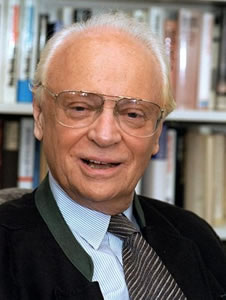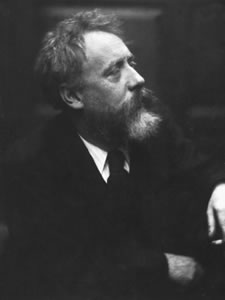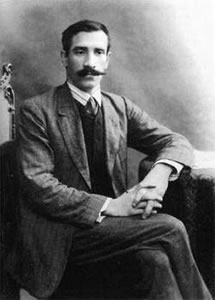De Hongaars/Israëlische schrijver Ephraïm Kishon werd op 23 augustus 1924 in Boedapest geboren. Zie ook mijn blog van 23 augustus 2006.
Uit: Hausapotheke für Gesunde
“Viele Plätze sind schön, am schönsten aber ist es zu Hause, sagte einer der altgedienten Galeerensträflinge. Und tatsächlich, eine geräumige, sonnendurchflutete Behausung kann ohne weiteres gegen einen noch so langen Seeurlaub aufgewogen werden.
Die Schwierigkeiten jedoch, eine alle Bedürfnisse befriedigende Wohnmöglichkeit zu finden, sind bereits seit Erschaffung der Erde nicht zu unterschätzen.
Schon im Garten Eden wurde, kurz nach der Ausweisung des ersten Ehepaares, folgende Tafel am Eingang angebracht:
“Infolge Abreise der bisherigen Mieter: ein Paradies zu vermieten”.
Es meldeten sich nur wenige Bewerber. Einer, mit einem dicken Weib im Schlepptau, erklärte nach oberflächlicher Besichtigung der Örtlichkeit, daß sich bei jedem Regen unpasierbare Kotpfützen bilden würden. Und im Winter würde man sich erkälten; er sehe keinerlei Heizvorrichtung.
“Wie lange dauert es denn noch bis zur Erfindung des Feuers?” fragte er.
“Eine Million Jahre”, antwortete der Erzengel Gabriel bedauernd.
Der Mietvergtrag kam nicht zustande.
Er wäre sowieso nicht zustande gekommen, weil das dicke Weib allergisch gegen Vögel war:
“Dieses ewig Gezwitscher vertrage ich nicht. Außerdem reagiere ich allergisch auf jede Art von Gefieder.”
Damit zog sie ihren Mann zum Ausgang.
“Wir könnten es ja mit Cortison versuchen,” rief Gabriel hinter den beiden her.
Aber da waren sie schon verschwunden.
Als nächster kam Ingenieur Glick. Er inspizierte das Objekt mit gewohnter Gründlichkeit und schüttelte immer wieder den Kopf:
“Kein Kühlschrank … keine Klimaanlage … …wir werden im Sommer einen Hitzschlag kriegen!”.
Der Erzengel machte sich erbötig, mit Gott dem Herrn über eine mögliche Neugestaltung der Jahreszeiten zu sprechen, aber Glick vermochte diesem Vorschlag nichts abzugewinnen, schon deshalb nicht, weil mittlerweile alles, was da kreuchet, an seinen Beinen hinaufzukreuchen begann. Ob man denn hier noch nichts von Hygiene gehört hätte, fragte er.
Doch, aber Desinfektionssprays könne man nicht verwenden, antwortete Gabriel entschuldigend. Wegen der Äpfel.”

Ephraïm Kishon (23 augustus 1924 – 29 januari 2005)
De Engelse dichter en schrijver William Ernest Henley werd geboren op 23 augustus 1849 in Gloucester.
Ballade of Dead Actors
Where are the passions they essayed,
And where the tears they made to flow?
Where the wild humours they portrayed
For laughing worlds to see and know?
Othello’s wrath and Juliet’s woe?
Sir Peter’s whims and Timon’s gall?
And Millamant and Romeo?
Into the night go one and all.
Where are the braveries, fresh or frayed?
The plumes, the armours — friend and foe?
The cloth of gold, the rare brocade,
The mantles glittering to and fro?
The pomp, the pride, the royal show?
The cries of war and festival?
The youth, the grace, the charm, the glow?
Into the night go one and all.
The curtain falls, the play is played:
The Beggar packs beside the Beau;
The Monarch troops, and troops the Maid;
The Thunder huddles with the Snow.
Where are the revellers high and low?
The clashing swords? The lover’s call?
The dancers gleaming row on row?
Into the night go one and all.
Barmaid
Though, if you ask her name, she says Elise,
Being plain Elizabeth, e’en let it pass,
And own that, if her aspirates take their ease,
She ever makes a point, in washing glass,
Handling the engine, turning taps for tots,
And countering change, and scorning what men say,
Of posing as a dove among the pots,
Nor often gives her dignity away.
Her head’s a work of art, and, if her eyes
Be tired and ignorant, she has a waist;
Cheaply the Mode she shadows; and she tries
From penny novels to amend her taste;
And, having mopped the zinc for certain years,
And faced the gas, she fades and disappears.

William Henley (23 augustus 1849 – 11 juli 1903)
De Amerikaanse dichter Edgar Lee Masters werd geboren op 23 augustus 1868 in Garnett, Kansas.
A.D. Blood
If you in the village think that my work was a good one,
Who closed the saloons and stopped all playing at cards,
And haled old Daisy Fraser before Justice Arnett,
In many a crusade to purge the people of sin;
Why do you let the milliner’s daughter Dora,
And the worthless son of Benjamin Pantier,
Nightly make my grave their unholy pillow?
Aaron Hatfield
Better than granite, Spoon River,
Is the memory-picture you keep of me
Standing before the pioneer men and women
There at Concord Church on Communion day.
Speaking in broken voice of the peasant youth
Of Galilee who went to the city
And was killed by bankers and lawyers;
My voice mingling with the June wind
That blew over wheat fields from Atterbury;
While the white stones in the burying ground
Around the Church shimmered in the summer sun.
And there, though my own memories
Were too great to bear, were you, O pioneers,
With bowed heads breathing forth your sorrow
For the sons killed in battle and the daughters
And little children who vanished in life’s morning,
Or at the intolerable hour of noon.
But in those moments of tragic silence,
When the wine and bread were passed,
Came the reconciliation for us —
Us the ploughmen and the hewers of wood,
Us the peasants, brothers of the peasant of Galilee —
To us came the Comforter
And the consolation of tongues of flame!

Edgar Lee Masters (23 augustus 1868 – 5 maart 1950)
Zie voor bovenstaande schrijvers ook mijn blog van 23 augustus 2007 en ook mijn blog van 23 augustus 2008.
De Russische schrijver Aleksander Grin (eig. Aleksandr Stepanovitsj Grinevski) werd geboren in Vjatka op 23 augustus 1880. Zijn moeder overleed toen Grin 13 was. Na het voltooien van zijn opleiding, ging Grin naar Odessa, waar hij vele dienstbetrekkingen had, zoals matroos, mijnwerker of bouwvakker. Vaak had hij echter geen betrekking en moest hij zijn toevlucht nemen tot bedelen. Nadat hij het leger in was gegaan, sloot hij zich aan bij de Sociaal-Revolutionaire Partij, en deserteerde. Dit leidde tot zijn arrestatie en gevangenisstraf wegens het bedrijven van revolutionaire propaganda. In 1906 publiceerde hij zijn eerste novelle, maar in hetzelfde jaar werd hij opnieuw gearresteerd in Sint-Petersburg. Hij werd veroordeeld tot 4 jaar verbanning naar Tobolsk in Siberië. Grin ontsnapte echter kort na aankomst in Tobolsk en keerde terug naar Sint-Petersburg. In 1910 werd hij opnieuw opgepakt en verbannen naar Archangelsk. Daar leefde hij samen met zijn vrouw van 1910 tot 1912. Na terugkeer in Sint-Petersburg scheidde hij van zijn vrouw. Hij had tot dan slechts korte verhalen geschreven, maar na de Russische Revolutie zou Grin ook langere verhalen schrijven. In 1921 trouwde hij opnieuw, en in 1924 verhuisde het gezin naar Feodosija op de Krim, zodat Grin dicht bij zijn geliefde zee kon leven. Grin’s romantische schrijfstijl was niet geliefd bij de Sovjet uitgeverijen, en het gezin leefde in grote armoede. Grin overleed aan tuberculose in Stari Krim.
Uit: A Trip (Vertaald door Barry Scherr)
„The traveller Ammon Root returned to his native land after an absence of several years. He stayed with Tonar, an old friend of his, who was the director of a joint-stock company and a person with a shady past-but also a fanatic for decorum and probity. On the very day of his arrival Ammon quarrelled with Tonar over a newspaper editorial, called his friend a minion of the minister, and stepped outside for a walk.
Ammon Root was one of those people who are more serious than they appear at first glance. His travels were not mentioned by the newspapers, nor did they cause a single map to make the slightest change in its depiction of the continents, but they were still absolutely necessary for him. “To live means to travel,” he would say to those people who were attached to life just on the side of it that is most warm and steamy, like a hot pie. Ammon’s eyes-two eternally greedy abysses-ransacked heaven and earth in their search for new spoils; abysses-everything he saw plunged
headlong into them and was packed away once and for all in the fearful crush at the bottom of his memory, to be kept for his own use. In contrast to tourists Ammon saw far more than the museums and churches where the viewers, pretending to be experts, seek ethereal beauty in poorly-executed paintings.
Out of curiosity Ammon Root stopped in at a cafeteria that served vegetarian food. About a hundred people were sitting in the large rooms, which smelled of varnish, paint, freshly-dried wall-paper, and some other particularly abstinent odour. Ammon noticed the absence of any old people.
An extraordinary silence, which was out of keeping with even the concept of food, inspired the appetite of anyone coming in to be prayerfully delicate and bodiless, like the very idea of herbi
vority. The pious but ruddy faces of the health fanatics cast indifferent glances at Ammon. He sat down. The dinner, served to him with a ceremonial and somewhat accentuated solemnity, consisted of a repulsive gruel called “Hercules”, fried potatoes, cucumbers, and some insipid cabbage. Ammon poked around with his fork in this gastronomical paltriness, ate a piece of bread and a cucumber, and drank a glass of water; then he snapped open his cigarette case, but he remembered that smoking was prohibited and looked around gloomily. At the tables mouths were chewing sedately and delicately in a death-like silence.“

Aleksander Grin (23 augustus 1880 – 8 juli 1932)
Zie voor onderstaande schrijvers ook mijn blog van 23 augustus 2007.
De Roemeense essayist, filosoof, kunsthistoricus en politicus Andrei Gabriel Pleşu werd geboren op 23 augustus 1948 in Boekarest.
De Duitse dichter Theobald Hock werd geboren op 23 augustus 1573 in Limbach/Pfalz-Zweibrücken.
